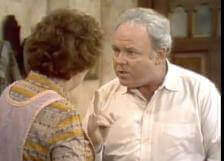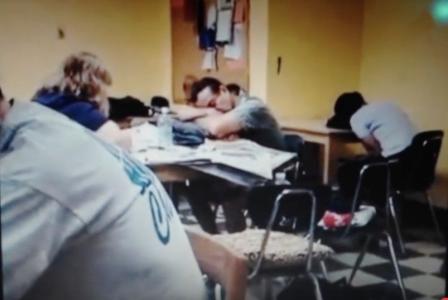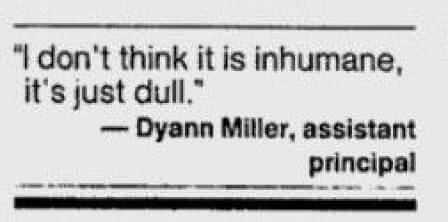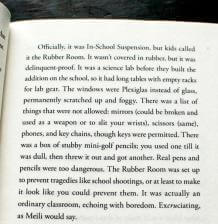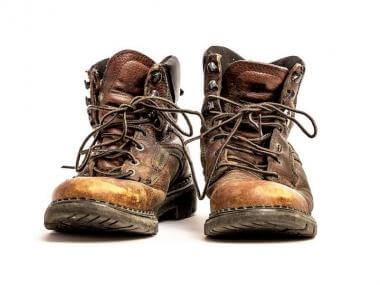Why Do We Say ‘Rubber Room’?
Andrew Simonet, author of “Wilder,“ explores the origins of the phrase “rubber room,” a key setting in his book.
I wrote a novel I called “The Rubber Room” about two high school students who meet on in-school suspension.
My editor disliked the title. “I’d like to suggest that we consider a different title. I have a viscerally negative reaction to the term ‘the rubber room.'” The marketing and sales team said it conjured sex rooms and the mistreatment of the mentally ill. We retitled it “Wilder.”
But sex rooms? I started asking people what “rubber room” meant, and found no consensus.
The Oxford English Dictionary yielded nothing. Of the six slang dictionaries I checked, only Green’s offered references:
Beckett, such a literary first citation and, it turns out, a prescient one. But could 1938 really be the earliest usage?
I dug in.
And now, I present a brief family tree of “rubber room,” with four branches, a disco, and three bogus etymologies.
Branch One: The Asylum
“We have not had occasion once to use even our India-rubber rooms for any other purposes than as ordinary dormitories…”
Suffolk Lunatic Asylum, Annual Report of Medical Officer, 1845.
The earliest reference I could find, this report conveys its brutal assumptions about mental illness—and language’s role in those assumptions—in its first sentence: “There are, in the county, perhaps about three hundred and sixty insane paupers, i.e. lunatics and idiots.” But the report also argues against the use of restraints and coercion with this strikingly progressive adage: “You may do almost everything by soothing and kindness, you can rarely do almost anything but mischief by force.” This, coincidentally, could serve as my narrator’s epitaph.
As with other sensationalized and suspect mental health practices (strait jacket, lobotomy, shock therapy), rubber room became shorthand for losing one’s sanity. If you or someone you know has ever been institutionalized by force, you may flinch at these light-hearted uses.
This 1965 “Popular Mechanics” article quotes one cab driver: “When you drive 150 miles a day in the kind of traffic, you’d become a rubber-room case if you got mad every time you got cut off.”
And this from the December 2, 1972 episode of “All in the Family”:
Branch Two: The Labor Dispute
Workers no longer needed by a company, but whose union stipulates they remain employed, languish in the second incarnation of “rubber room:” the room of endless boredom. So boring, management hopes workers will quit rather than show up. Here, the term flips from a room designed to protect an unstable person to a room designed to make a person unstable. General Motors had them all over the country in the early 2000s:
“New York Magazine” recounted New York Typographical Union No. 6’s rubber room, offering two false origin stories for the term:
“They called it the Rubber Room because guys used to bounce off the walls,” says one former news reporter. (Others see bridge-playing connotations in the name.)”
The most famous union rubber room is for New York City teachers accused of misconduct. The 2010 documentary “The Rubber Room” captures the Beckettian limbo of spending years not working.
Branch Three: The Disco
Rubber can certainly mean condom, but I was surprised some people thought a rubber room was sexual. Then I read about Studio 54:
At the top of the club, in the 3rd floor, overlooking both the balcony and the huge dance floor was the infamous Rubber Room. The room had a High-Tec bar and was designed with thick rubber on the walls to be easily washed down with water and soap after all the sex and drugs going on up there.
In her cleverly titled memoir, “I’ll Never Write My Memoirs,” Grace Jones describes Studio 54’s “rubber room…that could be easily wiped down after all the powdery activity.”
Branch Four: The High School
Until my research, I didn’t know “Degrassi,” the high school television series, also had a rubber room.
“Degrassi’s” rubber room kids are a group of students who must take classes in the remedial room. Students stuck in the remedial room, nicknamed the rubber room by Degrassi students, are thought to be troubled by the Degrassi staff.
In 1988, the “Milwaukee Journal” described a less charming rubber room:
“Waupun High School students who misbehave are sent for full school days to the in-school suspension room, where they are forced to sit bolt upright on a wooden bench and are forbidden to speak, move, read or study. They must empty their pockets before serving their time and wristwatches are also taken away. Students spend from 9 a.m. to 3:25 p.m. in the room.”
The Waupun article also introduces False Etymology #3: “Students call it the “rubber room” because it has rubber wrestling mats on the floor. After school it is used for wrestling practice.”
Parents and students complained: “Prison inmates could not be subjected to such a stringent form of isolation.”
Waupun’s assistant principal summed up the ethical and aesthetic debate with this haunting epigram:
Which brings me to my rubber room. I’ll let Jason, the narrator of “The Rubber Room” “Wilder,” describe it:
Asylums, unions, Studio 54, and “Degrassi”: a lurid past for the alliterative rubber room. The slang reinventions of “rubber room” do ask a pointed question, one that Wilder is obsessed with: do we restrain people because they are unstable, or does the restraint itself make them unstable?


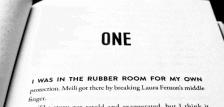


2.jpg?itok=w7ztWE-N)
